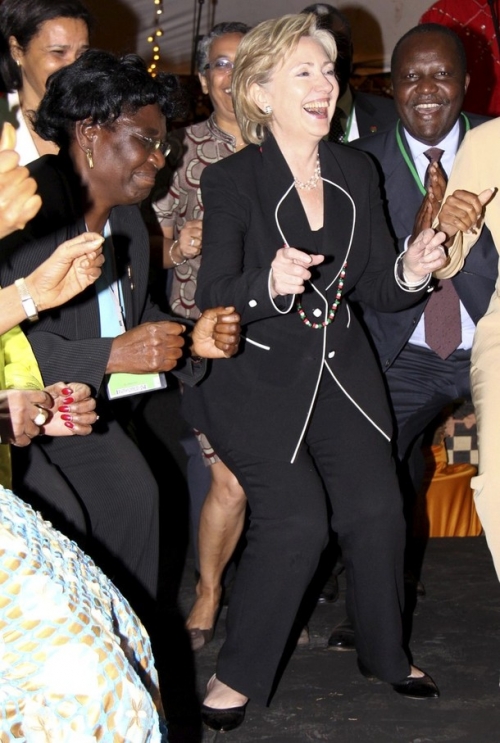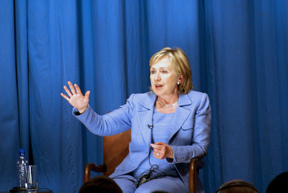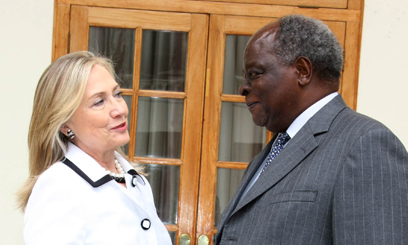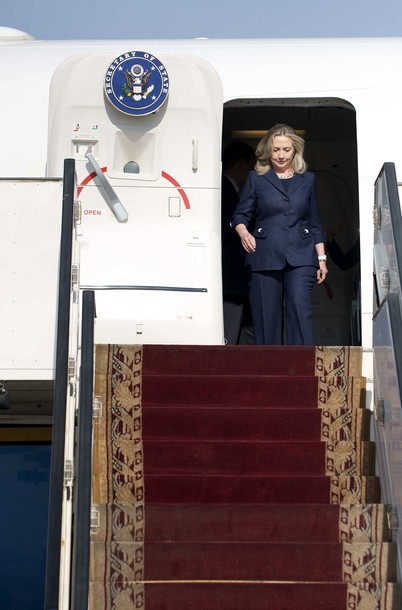Thank you so much, Director General, for not only those remarks but for the work that is done every day here at this premier organization designed to come forward with sustainable solutions for ending hunger and poverty. And I want to thank the International Food Policy Research Institute for hosting me today and for the leadership you show in a key area of global development – helping governments design and implement successful policies for reducing hunger and under-nutrition.
This is an issue that is on your minds every day, but it is now on the minds of many people because of the crisis that is raging in the Horn of Africa. It is, first, a food crisis; a severe drought has put more than 12 million people in Ethiopia, Kenya, Djibouti, and Somalia in danger of starvation. It is also a refugee crisis, because at this point, hundreds of thousands of people have left their homes in search of food and safety. Some are walking more than 100 miles with their children in their arms to reach refugee camps, which are so over-crowded that thousands wait outside the fences, and more arrive every minute, many close to death.
What is happening in the Horn of Africa is the most severe humanitarian emergency in the world today, and the worst that East Africa has seen in several decades. The United States and our partners in the region, including the World Food Program, the UN High Commissioner for Refugees, UNICEF, NGOs, and donor governments, are racing to save as many lives as possible.
Fortunately, we did, as the Director General just said, have a bit of a head start because of the Famine Early Warning System Network known as FEWSNet. The United States supports it along with others. It monitors drought and crop conditions and alerts governments and aid groups when crises are coming. This network, along with the analysis from the UN’s Food and Agriculture Organization, enabled us to begin pre-positioning food in key locations throughout the region starting last year. But a great deal more must be done, and it must be done fast. Famine conditions in Somalia are likely to get worse before they level off.
And while we hurry to deliver life-saving assistance, we must also maintain our focus on the future by continuing to invest in long-term food security in countries that are susceptible to drought and food shortages. It is this connection between food emergencies and food security that I would like to speak to today. Because our goal is not only to help the region come through this crisis, but working with organizations like IFPRI to do all we can to prevent it from ever happening again. Food security is the key.
Let me just briefly summarize our emergency response to date.
The United States is the largest single-country contributor of food and humanitarian assistance to the Horn of Africa. On Monday, President Obama announced that in light of the current crisis, we are making available an additional $105 million in emergency funding. Today, I’m announcing another 17 million on top of that with 12 million designed specifically for helping the people of Somalia. That brings the total U.S. humanitarian assistance to the region to more than $580 million this year. We are reaching more than 4.6 million people with this aid. It helps to pay for food distribution; for therapeutic feeding for those who are severely malnourished; for clean water, healthcare, sanitation, protection, and other services for those in need. And let me say how grateful I am to the aid workers who are delivering this assistance, swiftly and effectively, in extremely difficult and often dangerous circumstances.
Over the course of this crisis, U.S. officials have made multiple trips to the region, including just this past weekend to Kenya, a delegation led by Dr. Jill Biden and joined by former Senator Dr. Bill Frist; USAID Administrator Raj Shah; Eric Schwartz, our Assistant Secretary of State for Population, Refugees, and Migration; and Gayle Smith from the White House. They saw the best and worst of what is happening on the ground. They visited the Kenyan Agricultural Research Institute, a top-notch facility long supported by the U.S. Government. And I had the chance to visit it on my trip to Kenya two years ago. I was very impressed by the work that I saw there by scientists who are cultivating crops that can thrive in drought and are enriched with essential nutrients. These breakthroughs have already saved lives and I’m sure will save many more in the future.
But the delegation also visited Dadaab, the refugee complex in eastern Kenya. Even before this emergency, it was the largest refugee camp in the world. Some people have been living there now for 20 years. It was originally built for 90,000 people. Twenty years later, more than 420,000 live there, including thousands of third-generation residents.
So the current refugee crisis is taking place against the backdrop of a prolonged refugee crisis. The United Nations is working as fast as it can to build new facilities, but well over a thousand people arrive every day. Most – in fact, the vast majority of those arriving – are Somalis, because Somalia is the epicenter of this emergency. Southern and central Somalia are the only places in the region where famine has been officially declared, because unlike Ethiopia and Kenya, Somalia has no effective national governance.
And the terrorist group al-Shabaab has prevented humanitarian assistance from coming in. It has killed and threatened aid workers. There are also credible reports that al-Shabaab is preventing desperate Somalis from leaving the areas under its control. Nonetheless, hundreds of thousands of Somalis, largely women and children, are managing to flee to the north or leave the country altogether. They are pouring over the borders into Ethiopia, Kenya, and Djibouti. That, in turn, severely strains the capacity of those local communities and countries.
The United States is now providing $92 million in emergency humanitarian assistance inside Somalia. To facilitate aid within Somalia’s central and southern region, we have recently issued new guidance about the use of U.S. funds to help aid groups working with the United States Government try to save more lives. Still, a great deal depends on whether al-Shabaab is willing to let international assistance be delivered. And so I once again urge al-Shabaab to heed the calls not only of the international community, including the Arab League, but of the cries of their own people, and allow the secure delivery of relief to all those who are afflicted.
The United States will continue to work with Somalis in the international community to bring the hope of peace and stability to Somalia, and we join all Somalis in hoping that there will be a future with a functioning government that can protect the Somali people against famine and help to build a sustainable agricultural sector.
These are the steps we are taking to address the immediate crisis. But as we proceed, we must not forget we have seen crises like this before. First comes a severe drought, then crops fail, livestock perish, food prices soar, thousands of people die from starvation, most of them children, and thousands more pick up and move. Every few decades, the cycle repeats. And it would be easy to throw up our hands and blame it all on forces beyond our control, but this cycle is not inevitable. Though food shortages may be triggered by drought, they are not caused by drought, but rather by weak or nonexistent agricultural systems that fail to produce enough food or market opportunities in good times and break down completely in the bad times.
In other words, a hunger crisis is not solely an act of God. It is a complex problem of infrastructure, governance, markets, education. These are things we can shape and strengthen. So that means this is a problem that we can solve if we have the will and we put to work the expertise that organizations like IFPRI possess. We do have the know-how. We have the tools. We have the resources. And increasingly, we have the will to make chronic food shortages and under-nutrition a memory for the millions worldwide who are now vulnerable.
And while some might say that this is a conversation for another time, that we should worry about preventing food crises only after this one has passed, I respectfully disagree. Right now, when the effects of food security are the most extreme, we must re-dedicate ourselves to breaking this cycle of food shortages, suffering, and dislocation that we see playing out once again in the Horn of Africa. We must support countries working to achieve food security. We owe it to the people whose lives we are trying to save, and frankly, we owe it to the donors and the taxpayers who make our work possible. Investing now decreases the chances that Americans or others will be called upon in the future to face these same challenges in 10 or 20 years from now. And I will argue that we will be investing in our own security by supporting political stability and economic growth worldwide.
For the past two and a half years, I have traveled the world from Kenya to India to Italy, talking to everyone from farmers and agricultural scientists to aid workers and heads of state, about Feed the Future, the U.S. food security initiative and a centerpiece of the Obama Administration’s foreign policy. The United States has pledged $3.5 billion to support rigorously developed plans to fortify the entire agricultural chain of our partner countries, from the fields and grazing areas where crops are grown and livestock raised, to the markets where farmers sell their wares, to the tables and hearths where people receive the nutrition they need to stay healthy.
To name just a few of the things that we are doing through our Feed the Future Initiative: We are helping farmers gain access to fertilizers and improved seeds. We are setting up extension services to teach methods of conservation agriculture. We are supporting the creation of cooperatives so farmers can gain more purchasing power and a greater political voice. We are spreading the tools for reducing post-harvest losses so after months of hard work and good harvests, farmers don’t lose 40, 50, 60 percent of their crops and the nutrition and the income they offer because of inadequate or poor storage.
We’ve also helped create a global partnership called 1,000 Days to improve nutrition during the critical period from the start of pregnancy through a child’s second birthday. Nutritional deficits during those 1,000 days lead to permanent stunting, reduced cognitive function, and a greater susceptibility to disease that cannot be reversed by improved nutrition later in life.
Two of our partner countries in Feed the Future are Ethiopia and Kenya. And even amid this crisis, they prove that progress is possible. The last time a drought of this magnitude struck Ethiopia, in 2002 and 2003, more than 13 million people faced starvation. Today, fewer than 5 million do.
Now, that is still an unacceptably large number, but it is also an astonishing improvement in a relatively short period of time. And it is evidence that investments in food security can pay off powerfully. In 2005, the Ethiopian Government established the Productive Safety Net Program with support from international donors, including the United States. It helps small-holder farmers diversify their crops, create local markets, better manage their water resources, and increase the nutritional content of their own diets and those of their children. More than 7.6 million farmers and herders have now been helped by this program, people who are not among those in need of emergency aid today.
In Kenya as well, people who were greatly affected by the last severe drought are now safe, even thriving. Paul Weisenfeld from USAID, who is here today, shared a story with me about a woman farmer he met last month from the northernmost arid part of Kenya. It has been the hardest hit by the current drought. She lives on a communal farm made up of former livestock herders whose animals all died in the previous droughts. Today, thanks to help from international donors, she and the other farmers raise various vegetables and fruits, including mangoes, and her crop is so abundant that she is not only selling them locally, but exporting them to the Middle East.
In both Ethiopia and Kenya, the United States is helping to carry out comprehensive strategies that were designed by the countries themselves to suit their distinct needs and strengths. In Ethiopia, a top priority is strengthening the value chain to help small-holder farmers sell their products at local and regional markets. In Kenya, supporting herders is a leading concern, so USAID is working to connect them to markets, improve animal health services, help local institutions lobby for better livestock trade policies.
Both governments have developed country investment plans; both have committed to invest at least 10 percent of their national budget on agriculture. Kenya is nearly there and Ethiopia has exceeded that goal. And in both countries we are paying special attention to gender, to ensure that the women who do a significant amount of the planting, harvesting, selling and cooking are effectively supported. And we’re also paying attention to the environmental impact of our programs to protect the water and the land for future generations and to help farmers adapt to the effects of climate change.
Our goals are ambitious. In the next five years, the United States aims to help more than half a million people in Ethiopia permanently escape poverty and hunger, and more than 430,000 children benefit from improved nutrition. In Kenya, we aim to raise incomes and improve nutrition for 800,000 people. But there are still millions of people in these countries and certainly throughout the world who need emergency help, and they need it now. And yes, we are trying as hard as we can to reach them. But it is also important to recognize that there must be concerted efforts by governments and people to help themselves, and there is no question that Ethiopia and Kenya are moving in the right direction. Now we must help them continue that progress, and that is a job for all of us.
The primary responsibility naturally does lie with governments and with the people of countries like Ethiopia and Kenya. I have reached out to the leaders of these countries, and they know the kinds of changes that they still need to make. They need to move toward free trade in grain imports and exports. They need to improve credit and land-use policies to support farmers and herders. They need to ensure that public grain reserves are available when shortages loom. And they need to welcome new technologies to bolster drought tolerance, disease resistance, and crop yields. These can be challenging policies to get right, but they are absolutely essential for ensuring wise stewardship of the land and sustainable economic opportunities for the people. Meanwhile, the countries that pledged their support for food security at the G-8 Summit in L’Aquila in 2009 must make good on their commitments.
I certainly understand the difficult budget times we are living through. But we have to rededicate ourselves to doing development differently, as we said we would. New donor countries have gotten involved to end the current food emergency. I urge them also to join with us in helping to create lasting food security. A year ago, the United States led the G-20 countries in establishing an innovative, fund-based program at the World Bank called the Global Agriculture and Food Security Program. By pooling our resources and our efforts behind country-developed and country-owned plans, we can reach more farmers and more villages and multiply our impact. This fund shares many of the characteristics of our own Feed the Future initiative, including a strong voice for civil society and rigorous systems for monitoring and evaluating results to make sure contributions are making a real difference in people’s lives. With support from seven donors – Australia, Canada, Ireland, the Republic of Korea, Spain, the United States, and the Bill and Melinda Gates Foundation – the fund has already awarded nearly half a billion dollars to 12 countries, including a $51.5 million grant to Ethiopia.
We are also looking to the private sector to contribute, especially in coming up with innovative ideas for reducing hunger and food insecurity. To offer two examples, we are working with a tech company on the ground in Africa called Souktel to text life-saving information to people across the region, so they know where relief can be found nearby. And we are supporting a partnership among General Mills, Cargill, and the Dutch company DSM, who are assisting food processors in Kenya and other countries improve their ability to produce high-quality, nutritious, safe food. This will benefit local consumers and prepare local food producers to compete in regional markets.
And I’ve said before in many settings, particularly at AGOA conferences, Africa must drop its trade barriers so that the African people can trade with each other. Sub-Saharan Africa has more trade barriers and they are more limited in inter-country regional trade than any part of the world.
Finally, we need the contributions of caring individuals here in the United States and around the world. We have seen this in previous crises, from the Indian Ocean tsunami in 2004 to the earthquake in Haiti; individual donations can have a tremendous impact. Even just a few dollars can save lives. And the heroic organizations operating in the Horn of Africa right now need all the support we can offer. The USAID homepage provides access to information about several groups, so it’s an easy way for people to help. Just visit USAID.gov. Another way to help is through mobile giving. One program that supports life-sustaining efforts in the Horn of Africa is the United Nations World Food Program. You can give ten dollars to the World Food Program USA by texting A-I-D to the number 27722.
Humanitarian assistance is in the American DNA. It is one of our core values, and the American people have shown time and again that we will give to help people in dire circumstances. We are inspired to see the outpouring that has already begun, and we hope it will continue and grow.
Additionally, the State Department is working with the American Refugee Committee and the design firm IDEO on the “Neighbors” campaign to engage the Somali diaspora, not only the United States but around the world, to help raise awareness and funds for the relief efforts. And we are working with the White House to mobilize churches, mosques, and synagogues to support this effort.
We must remember that time is not on our side. Every minute, more people, mostly women and mostly children, are dying. They’re becoming sick. They are fleeing their homes. We must respond. We need to rise to the level of this emergency by acting smarter and faster than we have before to achieve both short-term relief and long-term progress.
Think of what it would mean if we do succeed. Millions of people would be saved from this current calamity. Millions more would no longer live tenuous existences, always prepared to pick up and move to find food if drought or conflict or other crises occur. Parents would no longer have to endure the agony of losing their children when the food runs out. And food aid from countries like the United States would be needed much less frequently because we are now supporting agricultural self-sufficiency.
This would be a transformational shift for the people of our partner countries. It would be a new era of security, stability, health, and economic opportunity, peace, and stability. And it would signal a new chapter in the world’s relationships with the people of these countries. As they become themselves able to care for their families, they will become real models and examples of prosperity and stability and they will become partners to do even more to help people live up to their own God-given potential.
If we achieve that future, we will have done something truly remarkable. Just as the Green Revolution made such a difference, what we are trying to do now is to get back to what worked then, focus on the basics, focus on the work that is done by IFPRI. I had a change to meet the directors, and they’re working on how you enhance nutritional substance with micronutrients. They’re working on how you provide better seeds for crops, how you help herders whose natural desire is to hold on to their livestock because it represents to the rest of the world their significance.
All of this is in the tradition of the Green Revolution, which made such a difference. But then the world moved away, thinking that our work was done. And in fact, it was not. And we got very good at delivering emergency assistance when we put our minds to it, but we lost our way. And we have to do both, both the crisis and the future investments, so that we can see progress in very tangible ways. And history will record that as being a significant accomplishment for all, including those of you in this room, who played your part.
So we have a lot of work ahead of us, but I came today to make sure that in my own country and beyond, people know we have a crisis and we must respond. We must try to save those lives that are being lost in those brutal marches to try to get to safety. We must support the refugee camps and do everything we can to provide the immediate help that is needed. But let’s not just do that, as important as that is. Let’s use this opportunity to make very clear what more we need to do together to try to avoid this happening again. And I could think of no better place to come to make that plea and to issue that challenge than to the International Food Policy Research Institute. Thank you all very much. (Applause.)





























